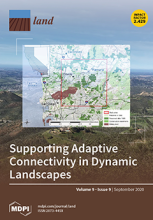/ library resources
Showing items 1 through 9 of 51.To investigate the rural labor transfer effects of China’s Collective Forestland Tenure Reform (CFTR), we employ binary probit models by using survey data of 694 households from China’s northern collective forest areas.
A discussion of the assumptions that underlie efforts to register land enables us to not only evaluate their validity across different contexts, but most importantly, to further understand how the low incidences of land registration might derive from very fundamental sources outside of difference
In an era of global warming, long-standing challenges for rural populations, including land inequality, poverty and food insecurity, risk being exacerbated by the effects of climate change.
The 2019 fire crisis in Amazonia dominated global news and triggered fundamental questions about the possible causes behind it. Here we performed an in-depth investigation of the drivers of active fire anomalies in the Brazilian Amazon biome.
Existing studies on blockchain within land administration have focused mainly on replacing or complementing the technology for land registration and titling.
The rise of urban populations has rendered cities in both developed and developing countries vulnerable to poor health and diseases that are associated with urban living conditions and environments.
Informal settlements represent a challenging operational context for local government service providers due to precarious contextual conditions.
There are millions of unrecorded land rights in sub-Saharan Africa, which are still not mapped. Therefore, there is a clear demand for innovative solutions for land tenure recording, as also written in the target 1.4 of UN Sustainable Development Goals (SDGs).
International policy is currently witnessing a renewed interest in customary tenure systems as well as traditional leadership, through which it aims to enhance the efficiency of local governance and create general access to and secure rights in land.
Pagination
Land Library Search
Through our robust search engine, you can search for any item of the over 73,000 highly curated resources in the Land Library.
If you would like to find an overview of what is possible, feel free to peruse the Search Guide.


